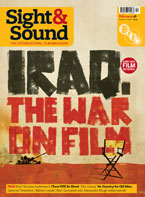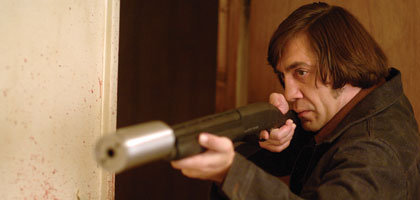Primary navigation


The Coens have turned their trademark humour and genre subversion to a thriller about guns, drugs and money in 1980s Texas. But at its heart is an interrogation of American manhood, say Ben Walters and J.M. Tyree
"All right," Llewelyn Moss mutters to himself, lying awake in bed next to his sleeping wife Carla Jean. A few hours earlier he stashed beneath their Texas trailer-home a briefcase containing millions of dollars in cash, retrieved from a borderlands heroin deal-turned-massacre whose bloody aftermath he stumbled on while hunting in the desert. He has now decided to take some water to the shoot-out's apparent sole survivor, whom he left wheezing and incapacitated in a pick-up truck. As he fills a gallon jug, Carla Jean comes sleepily into the kitchen and asks what her husband is up to. "Fixin' to do somethin' dumber 'n' hell," he tells her. And he's right: by returning to the scene he exposes himself to the people searching for the money and brings about the destruction of his and Carla Jean's life.
Conventional narrative models demand an obstacle between the hero and the object of his desire; in the Coen brothers' films, that obstacle is usually the hero's stupidity. Think of the obtuseness of the lead of Barton Fink (1991), the emotional tone-deafness of Ed Crane in The Man Who Wasn't There (2001) or the lovable idiocy of Jeff Bridges' Dude (The Big Lebowski, 1998) and Tim Robbins' Norville Barnes (The Hudsucker Proxy, 1994). As the protagonist of No Country for Old Men, Josh Brolin's Moss gets points for at least recognising from the start that he's going to get his "dumb ass shot".
No Country is a pitch-perfect thriller that delivers the pleasurable fear and suspense expected of the genre even as it sends its conventions to the shredder. It is masterfully designed and shot, with brilliant sound editing and perhaps the subtlest score in film history, by Carter Burwell; a study could be written just of its use of wind noises. The nightmare quality of the story and the bone-dry humour of the dialogue seem oddly complementary: somehow the Coens linger at the gallows cracking jokes without losing sympathy for the dead. "These boys appear to be managerial," a deputy sheriff notes of some well-dressed corpses at the scene of the massacre.
Set in 1980, No Country returns to the territory of the Coens' debut Blood Simple (1983), the windy desolation of the Lone Star state externalising the mindset of a country that's "hard on people" - especially those who go against the tenets of Reaganite self-sufficiency without thinking things through. If Blood Simple's dumber-'n'-hell Ray (John Getz) enmeshes himself in a net of deceit and homicide when he decides to clear up a murder scene for which he mistakenly believes his lover is responsible, Moss too puts his head on the block through an ill-considered act of altruism. "Down here," Blood Simple's opening voiceover points out, "you're on your own." Yet this is not always the case: despite the Coens' reputation as incorrigible cynics, they have offered a number of studies in redemptive love and friendship, and No Country is no exception. But such relationships must be worked at and often yield vulnerability as well as support.
The Coens have always quoted and pastiched other films and books but this is their first direct adaptation. It's easy to see what drew them to Cormac McCarthy's 2005 novel, a baroque cash-in-a-bag period piece with a literary-pulp heritage stretching back to Faulkner and the bleak dime-store tragedies of James M. Cain. McCarthy's story was ideally suited to the subversion of genre that characterises the Coen project and the new film is extraordinarily faithful to its source, distilling its morbid humour and meditations on the unfathomability of evil into a concise nightmare of impending doom and a relentless chase by the demons unleashed by bloodstained money.
Both novel and film offer many of the conventional delights of the genre, including a series of thrilling set-piece chases and shoot-outs (Moss is pursued across a river by a dog and shot at by an unseen sniper) and one of the most memorable villains of recent years. Yet there are radical departures from expectation too as the forces of law and justice - represented by Sheriff Bell (Tommy Lee Jones) - ultimately shrink from confronting evil. Jones' magnificent directorial debut The Three Burials of Melquiades Estrada (2005) was also set in the Texan borderlands and he's used to playing the gnarled, laconic veteran lawman. In his superb turn here, however, he also admits to bafflement, even fear. "Who are these people?" he wants to know.
McCarthy's novel is the kind of strong, astringent pulp which - like, say, Double Indemnity - can work better on screen than on the page. (The Coens indulge in a running gag about adaptation centred on a DEA agent who appears in the book but not in the movie; Sheriff Bell continually defers meeting him, believing, quite rightly, that he will add nothing to the case.) Certainly McCarthy's "prophet of destruction" Anton Chigurh - a sociopathic hitman hired by the drug cartel to hunt down the cash - improves in the translation. In Javier Bardem's extraordinary performance, lines like "What time do you go to bed?" become plausible death threats, despite (or because of?) his ridiculous haircut.
In McCarthy's book Chigurh's brand of radical evil is compelling but sometimes silly, and certainly unconvincing as an explanation for the failure of the war on drugs. Bardem's character, however, fits satisfyingly into the Coens' ongoing interrogation of American manhood, which they present as always problematic and often absurd, gleefully suggesting here that its most successful incarnation might be a serial killer. Patient, implacable and ultra-capable, Chigurh is also alien, even supernatural in his presumptive superiority. The model of consummate self-sufficiency, he seems to lampoon the frontier ethos of the Reaganite Cowboy Man: to Chigurh humans are a form of livestock, occasionally diverting but ultimately disposable; his favoured method of execution is a hydraulic cattle-gun. Plainly though non-specifically foreign, he takes a Martian's-eye view of American life. In one stand-out scene he bemusedly interrogates the proprietor of a mid-desert gas station. When the terrified man says he's closing up, Chigurh asks what time they close. "Now," he says. "We close now." Tickled and aloof enough to kill, Chigurh reminds him that "'now' is not a time."
There are no edifying models of manhood here. Sheriff Bell is well intentioned but troubled and halting; Moss is courageously but disastrously foolhardy. (Both Moss and Chigurh make repeated attempts at the sort of improvisatory survivalism that was a staple of 1980s television shows like MacGyver and The A-Team, though Chigurh is notably more accomplished.) In Bell's and Moss' marriages, though - with Bell's strongly reminiscent of the loving, supportive relationship between Marge and Norm in Fargo (1996) - the Coens once again suggest that human connection trumps Hollywood-style man-alone heroism. Just compare the relaxed, warm atmosphere of the Moss trailer or the Bell homestead with the dump motels to whose garish signage, flimsy walls and soulless decorations the film pays such keen and damning attention. Here as elsewhere, hotels are the setting for a series of big and little deaths, most of them pointless and dumb. Sheriff Bell recognises the absurdity at work in this world. "I laugh myself sometimes," he says. "Ain't a whole lot else you can do."